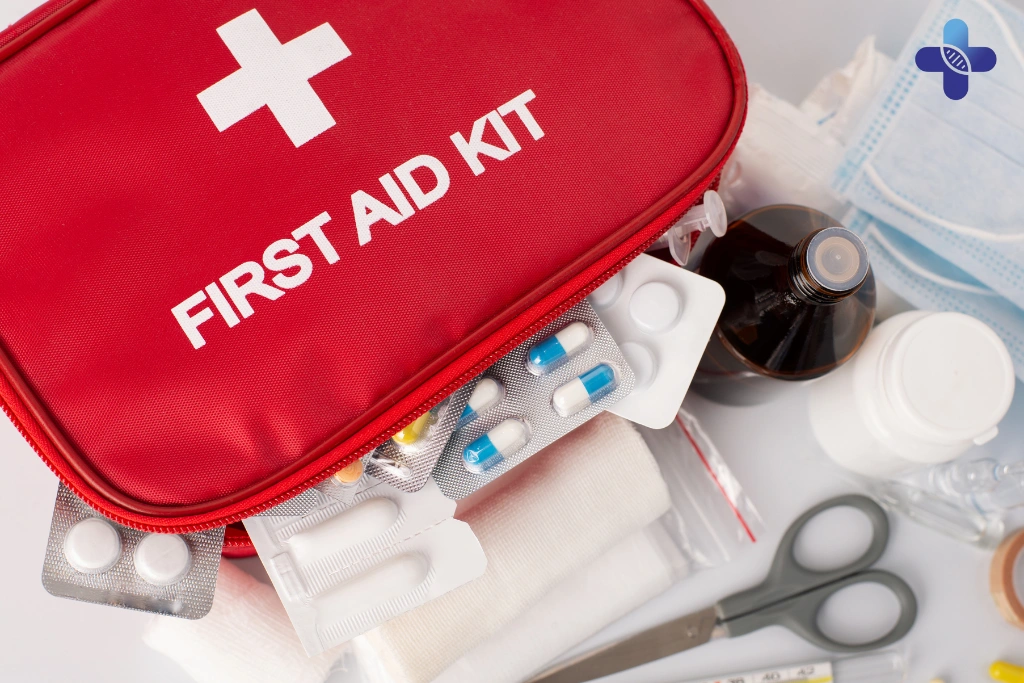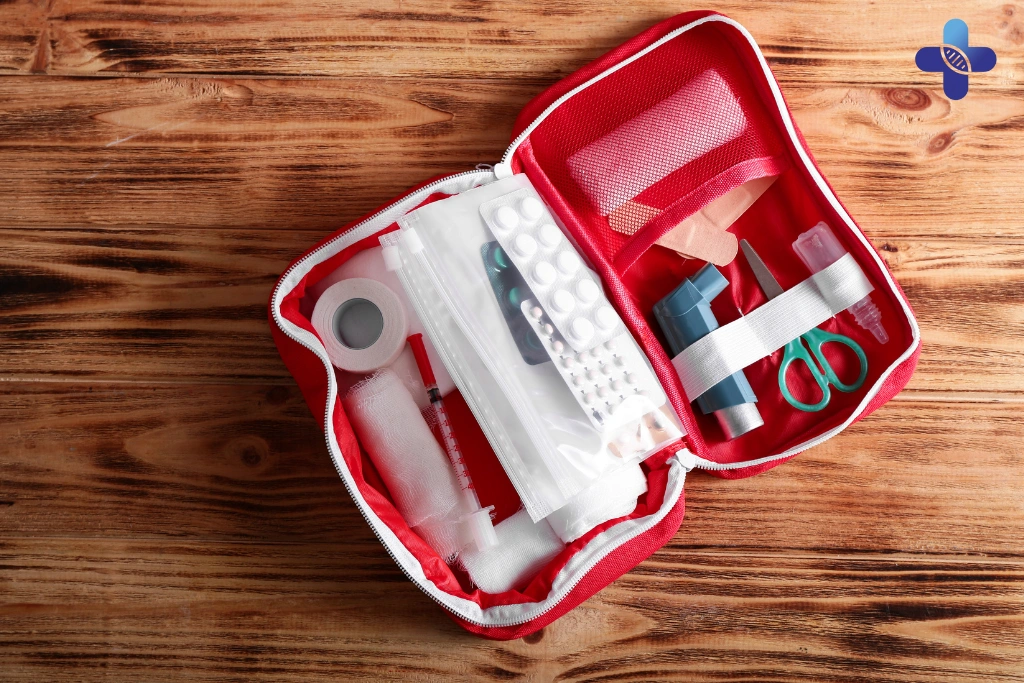A well-packed first-aid kit can mean the difference between a minor travel hiccup and a holiday-ending health scare. In this doctor-approved Bali first-aid kit checklist, we break down exactly what medicine to bring to Bali based on the most common issues faced by travelers. Whether it’s sunburn, “Bali Belly,” or scooter-related scrapes, our guide—prepared by the team at Life Everyouth, a trusted Medical Clinic in Bali—gives you the confidence to pack smart. As a leading Bali Medical Clinic, we’ve seen firsthand what’s missing in most tourist kits—and we’re here to fix that.
The Essential Bali First-Aid Kit: What Doctors Recommend You Pack

A well-packed first-aid kit is the difference between a minor inconvenience and a ruined holiday. Here’s what our doctors in Bali recommend.
At Life Everyouth Bali, we’ve treated thousands of travelers with preventable health issues—many of which could have been managed easily with the right supplies. From scooter-related wounds to digestive troubles like Bali Belly, the most common medical cases seen at any Medical Clinic in Bali often start small. But without prompt care or basic medication, they can escalate quickly.
This doctor-curated Bali first aid kit guide is designed to help you avoid that. It’s not just a checklist—it’s a practical medical game plan based on real patient cases and years of experience at our Bali Medical Clinic. If you’re wondering what medicine to bring to Bali, you’re in the right place.
The Essentials: For Common Bali Ailments
Every well-prepared traveler should expect the unexpected. At Life Everyouth, we’ve helped countless patients manage minor wounds, digestive upsets, and allergic reactions—many of which could have been minimized with a basic Bali first aid kit. Here are the non-negotiables you should pack before boarding that flight.
1. Wound Care (For ‘Bali Kiss’ Scooter Rash & Coral Cuts)
Bali’s tropical environment and busy roads mean wounds are common—especially from scooter accidents and reef scrapes. Proper initial care prevents infection and promotes faster healing. As a leading Medical Clinic in Bali, we’ve seen how minor cuts turn into serious infections when not treated early.
Antiseptic Wipes (Povidone-Iodine Based Is Great)
Use these to disinfect cuts, scrapes, or road rash immediately. Choose wipes that contain povidone-iodine, as they’re effective against a broad range of bacteria found in Bali’s environment.
Waterproof Plasters (Various Sizes)
Essential for covering cleaned wounds, especially if you’ll be sweating or swimming. Having a range of sizes ensures you can cover anything from a small nick to a medium abrasion.
Sterile Gauze Pads
Ideal for deeper scrapes or burns, gauze pads protect the wound while absorbing discharge. Replace them regularly to avoid infection, especially in the tropical Bali heat.
Medical Tape (Plester Gulung)
Use this to secure gauze in place when a regular plaster isn’t enough. A roll of medical-grade tape should always be in your Bali first aid kit.
Antibiotic Ointment
Apply a thin layer to cleaned wounds before dressing them. This minimizes the risk of bacterial infection, especially important in humid conditions or when riding scooters in dusty areas.
If your wound becomes swollen, red, or oozes pus, seek help at a trusted Bali Medical Clinic like Life Everyouth Bali.
2. Stomach & Digestion (For the Infamous ‘Bali Belly’)
Bali Belly—traveler’s diarrhea—is one of the most common reasons tourists visit a Medical Clinic in Bali. While most cases are mild, dehydration is a serious risk if not addressed quickly. These essentials help manage and recover from gastrointestinal distress.
Anti-Diarrhea Tablets (Loperamide)
These tablets can provide quick relief when you’re stuck in a hotel room or on a long journey. They slow bowel movement but do not treat the underlying cause. Use them sparingly and never as a substitute for rehydration.
Activated Charcoal Tablets
Charcoal helps absorb toxins in the gut. Though not a cure, it can ease symptoms of mild food poisoning or Bali Belly, especially in early stages. Always use according to instructions.
Oral Rehydration Salts (ORS)
Arguably the most important item in your Bali first aid kit. ORS restores lost fluids and electrolytes, preventing dangerous dehydration. Dissolve in clean water and sip slowly—especially if you’re experiencing vomiting or diarrhea. This simple item often makes the difference between recovery at your hotel or an emergency visit to Life Everyouth, a reliable Bali Medical Clinic.
3. Pain, Fever & Allergies
Pain, inflammation, fever, and allergic reactions can interrupt your holiday without warning. Whether it’s a headache from the heat, joint pain from surfing, or a rash from insect bites, these basics cover multiple situations.
Painkillers (Ibuprofen or Paracetamol)
Always carry at least one type of over-the-counter pain relief. Ibuprofen helps reduce inflammation (ideal for muscle soreness), while Paracetamol is gentler on the stomach and good for general fever or headaches. Consult your doctor before using if you have existing conditions.
Antihistamine Tablets
Essential for allergic reactions, whether from insect bites, food, or tropical plants. They help reduce itching, swelling, and irritation. If a rash or swelling becomes severe, contact a Medical Clinic in Bali like Life Everyouth Bali for professional care.
Highly Recommended Additions for a Comprehensive Kit

Beyond the basics, there are items that don’t seem urgent—until they are. These additions elevate your Bali first aid kit from “good” to “complete.” At Life Everyouth, we frequently assist travelers with skin reactions, bites, and temperature-related discomfort that could have been managed earlier with the right supplies. Here’s what we recommend for maximum preparedness.
Skin & Bite Relief
Bali’s tropical climate is home to intense sun and plenty of insects. Skin issues are some of the most reported conditions at any Medical Clinic in Bali, and prevention is far better than treatment.
Hydrocortisone Cream 1%
This mild steroid cream soothes inflamed or itchy skin caused by insect bites, rashes, or mild allergic reactions. Apply sparingly on affected areas. If itching worsens or rash spreads, visit a Bali Medical Clinic for stronger medication or diagnosis.
Aloe Vera Gel
Essential for soothing sunburn and calming irritated skin. Aloe vera provides cooling relief after overexposure to UV rays, which is common in Bali. Keep it in a travel-sized tube for quick access.
Insect Repellent with DEET or Picaridin
Bali is a dengue-endemic region. Prevent mosquito bites by applying a repellent that contains DEET (at least 20%) or Picaridin. Both are clinically proven to deter mosquitoes, including the Aedes aegypti species. This is one of the simplest ways to stay out of a Medical Clinic in Bali.
When it comes to skin safety, Life Everyouth Bali urges travelers not to underestimate the long-term effects of bites, burns, or allergic rashes.
Personal Medications & Tools
These tools may seem secondary—until you need them. Many guests at Life Everyouth, a trusted Bali Medical Clinic, arrive without essential medical items that could have prevented a trip to our clinic altogether.
Personal Prescription Medication (With Prescription Copies)
Bring all personal medications in clearly labeled containers, along with your doctor’s prescription and a note explaining your condition. Indonesian customs may inspect your medication, and clinics like Life Everyouth cannot always replace foreign prescriptions immediately.
Digital Thermometer
Fever is a key indicator of many tropical infections, including dengue and Bali Belly complications. A compact digital thermometer helps you make informed decisions on whether to rest, self-treat, or consult a Medical Clinic in Bali.
Tweezers (Pinset)
Useful for removing splinters, sea urchin spines, or debris from minor wounds. A high-quality stainless-steel tweezer is worth the space in your kit.
Small Scissors
Perfect for cutting bandages, tape, or clothing around a wound. Scissors should be TSA-compliant if you’re packing your Bali first aid kit in carry-on luggage.
Knowing the Limits: When Your First-Aid Kit Isn’t Enough
A well-packed Bali first aid kit can handle most minor issues—but it’s not a substitute for professional medical care. At Life Everyouth Bali, we often see cases where travelers wait too long, hoping basic supplies will be enough. The key is knowing when self-treatment stops being safe—and when to seek help from a qualified Medical Clinic in Bali.
If you or someone you’re traveling with experiences any of the following, it’s time to stop relying on your kit:
- High fever above 39°C that does not improve with rest or paracetamol
- Severe or persistent diarrhea and vomiting lasting more than 24–48 hours
- Wounds that are deep, dirty, or showing signs of infection—such as redness, swelling, warmth, or pus
- Suspected bone fractures, especially after falls or scooter accidents
- Animal bites, which carry the risk of rabies or bacterial infection
In these scenarios, early intervention is critical. At Life Everyouth, our medical team offers quick assessments, appropriate diagnostics, and targeted treatments that go beyond what any traveler can carry. As a fully equipped Bali Medical Clinic, we’re available to step in when your first line of defense isn’t enough.
For symptoms that are severe or don’t improve, self-treatment is no longer the answer. It’s time to consult a professional. Our 24-hour doctor on call service can provide an accurate diagnosis and proper treatment—right where you are.
Conclusion Bali First-Aid Kit Checklist (2025): What Medicine to Pack

With a complete and well-planned Bali first aid kit, you’re equipped to handle most minor health issues on your own—allowing you to focus on enjoying the beauty of Bali with peace of mind. From treating small wounds to managing digestive upsets or skin reactions, this kit gives you the confidence and control to respond quickly and effectively.
However, when symptoms go beyond the basics, don’t hesitate to reach out. Life Everyouth Bali, a trusted Medical Clinic in Bali, is here to support you. Whether you need a fast consultation, a house call, or further treatment, our team is ready 24/7. Stay safe, stay prepared—and remember, we’re just a call away.
Frequently Asked Questions (FAQ) Bali First-Aid Kit Checklist (2025): What Medicine to Pack
Should I buy medicine in Bali or bring it from home?
While Bali has many pharmacies (apotek) stocked with basic medications, the brand names and active ingredients might differ from what you’re used to. If you’re feeling unwell, trying to decode unfamiliar packaging while navigating language barriers can be stressful. That’s why we always recommend bringing a small, personal supply of trusted medicine from home—especially for pain relief, stomach issues, and allergies. At Life Everyouth Bali, we’ve seen how having the right meds at hand can save time and discomfort.
What are the rules for bringing prescription medication into Bali?
Indonesian customs take prescription medication seriously. You must carry it in its original packaging, along with a copy of your doctor’s prescription and a brief doctor’s note explaining your condition. It’s also wise to bring a supply that covers your full stay—plus a few extra days in case of delays. If you’re unsure whether your medication is regulated in Indonesia, consult your embassy or a Medical Clinic in Bali like Life Everyouth before your trip.
What is the single most important item people forget to pack?
Oral Rehydration Salts (ORS). Travelers often remember anti-diarrhea tablets but overlook ORS—critical for replacing fluids and electrolytes lost during bouts of Bali Belly. Without proper hydration, recovery is delayed, and you risk severe dehydration. ORS is the one item that can truly stabilize you before needing help from a Bali Medical Clinic. Pack several sachets—they’re lightweight and life-saving.
What extra items should I pack for a child’s first-aid kit?
Children have unique needs when it comes to travel health. Add liquid or chewable paracetamol/ibuprofen, a digital thermometer, child-safe plasters, and a nasal aspirator for congestion. Always read and follow dosage instructions based on age and weight. At Life Everyouth Bali, we advise parents to also bring a small comfort item—like a favorite toy or blanket—to help reduce anxiety during treatment, if needed.
Are there natural or herbal remedies I should pack?
While natural remedies can be helpful for mild symptoms, they are not substitutes for proven medicine—especially in emergencies. Some travelers pack tea tree oil for minor cuts, ginger chews for nausea, and peppermint oil for headaches. These can be useful as complementary support but for conditions like diarrhea, fever, or infection, stick to evidence-based medication. If unsure, consult a professional at a Medical Clinic in Bali like Life Everyouth.
Where can I find a pharmacy (Apotek) in Bali?
Pharmacies are widely available across Bali, especially in tourist zones like Seminyak, Ubud, and Canggu. Look for a green cross sign, which indicates an official apotek. Trusted chains include Kimia Farma and Guardian, and many locations have staff who can communicate in basic English. If you’re in doubt about what to buy, consider contacting Life Everyouth Bali, a local Bali Medical Clinic, for guidance.
Should I worry about the expiration dates on my medicine?
Absolutely. Always check the expiration dates before packing your medications. Expired drugs may lose potency or even become harmful. If any item is close to expiring during your trip, replace it beforehand. This is especially important for antibiotics, pain relievers, and anything for chronic conditions. At Life Everyouth, we often help patients who arrive with ineffective supplies—don’t let this be you.
Can I pack my first-aid kit in my carry-on luggage?
Yes—and it’s actually recommended. Your first-aid kit should be easily accessible during flights, especially if you’re prone to nausea, headaches, or allergies. Just make sure that any liquids, gels, or creams are under 100ml (3.4 oz) and stored in a clear, resealable plastic bag to comply with airport security regulations. If you pack scissors or tweezers, ensure they meet TSA or airline safety requirements.
What specific items are good for scooter-related injuries?
Scooter accidents are common in Bali, leading to scrapes, burns, or what locals call the “Bali Kiss” from hot exhaust pipes. Be prepared with povidone-iodine antiseptic wipes, non-stick sterile gauze, and medical tape. This combo helps clean the wound, prevent infection, and cover it properly. If the wound shows signs of infection, don’t wait—visit Life Everyouth, a trusted Medical Clinic in Bali, for wound care and tetanus assessment.
At what point should I stop self-treating and call a doctor?
If your symptoms persist or worsen despite basic care, it’s time to get help. Call a doctor if you have a fever lasting over 2–3 days, inability to keep fluids down, severe or spreading pain, or if you’re uncertain or anxious about your condition. Don’t gamble with your health—Life Everyouth Bali offers 24/7 access to doctors, including on-call services, so you’re never alone in managing your wellbeing.
